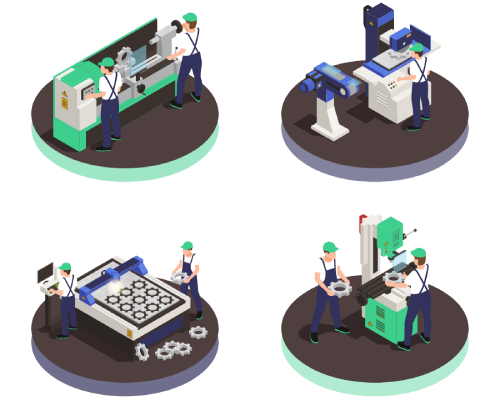ERP
ERP software for the mechanical engineering industry
In recent years, there has been a strong revival of interest in ERP worldwide, particularly in the industrial sector. The increasing digitalization of companies offers major levers for optimization.
Companies are looking for tools that offer functionalities covering all their activities: from design and production to commissioning. On this page, we’ll find out more about Enterprise Resource Planning for the mechanical engineering industry.
Contents
What are the mechanical engineering professions?
The mechanical engineering industry focuses on the design, manufacture, and sale of products such as machinery, equipment and components. It encompasses a wide variety of sub-sectors, including:
- automotive,
- aerospace,
- shipbuilding,
- industrial equipment,
- medical equipment and others.

What are the challenges and specificities of the mechanical engineering industry?
Production professions are characterized by a number of challenges and specificities that make them unique and require a particular approach. Here are some of the main challenges and specific features of these professions:
Producing parts requires a high degree of precision to guarantee their quality. Professionals must ensure that the components produced meet customers' technical and functional requirements, and comply with current standards and regulations.
Production costs are an important issue, and professionals must find ways to reduce costs while maintaining the production of quality products.
Mechanical engineering professionals often have tight delivery deadlines. Companies must therefore be able to produce and deliver on time to meet expectations.
Production companies must constantly innovate to meet market demands. Professionals must be at the cutting edge of technology and new trends to offer innovative and efficient solutions.
Production management is also a key element in guaranteeing quality, profitability, and customer satisfaction. Professionals must be able to effectively manage production, planning, procurement, and logistics to meet user demands.
Firms that succeed in meeting these challenges and specifications can gain a competitive edge in the marketplace. ERP is the tool that can help your company achieve your goals.
What are the functionalities of an ERP dedicated to the mechanical engineering industry?
An effective ERP must offer specific functionalities to meet the needs of your business sector. Here are a few key functionalities dedicated to your industry:

Management of bills of materials and manufacturing routings
Companies often produce complex products that require detailed BOMs and routings. ERP must enable you to manage this information efficiently to optimize production.

Production order management
Production orders are key elements in production management. ERP enables you to create, track, and manage production orders, lead times and profitability.

Inventory management
The software enables you to efficiently manage inventories of raw materials, spare parts and finished goods, to avoid stock-outs and optimize supply management.

Purchasing management
Purchasing is a key element in the supply chain. The tool must be able to manage suppliers, contracts, and orders to optimize costs.
What are the benefits of using ERP in the mechanical engineering industry?
Anticipating and planning your company’s activities can be complex, and requires the support of an efficient tool dedicated to your sector of activity. This will ensure efficient management of procurement and production, and help you gain in competitiveness.
ERP systems offer many advantages for your industry. Here are some of the most common direct benefits:

Integrated management
The tool enables integrated management of all company activities, such as inventory management, production, planning, purchasing, sales, etc. This allows processes to be optimized and streamlined, resulting in a better coordination of the company’s activities.

Improved visibility
Information can be centralized in a single database, giving greater visibility of data and processes. This enables more informed decision-making and better risk management.

Cost optimization
The tool enables better cost management, notably through inventory and order management. This helps optimize production costs.

Improved quality
ERP enables product quality to be tracked and monitored throughout the production process, enabling problems to be identified quickly.

Improved customer satisfaction
By producing top-quality products, delivering on time, and responding quickly to requests, an ERP can help improve customer satisfaction.
How to choose the right ERP software for the mechanical engineering industry?
Choosing ERP software for the mechanical engineering industry is an important decision that can have a significant impact on your company’s operations.
Here are a few steps to help you choose the solution best suited to your company’s needs:

Assess your needs
Identify your company's key processes and the necessary elements you need to support them. This may include specific needs such as production management or inventory tracking.
Ask for demonstrations
Contact software publishers and ask for demonstrations to see how the different functionalities are presented. You can also ask about customer references.
Assess scalability
Make sure that the software can adapt to your changing business needs to ensure efficient long-term management.
These preliminary steps to the installation of your future ERP system are essential if you are to choose the software package that best meets your company’s needs.
Read our white paper to find out more about the steps involved in drawing up your specifications:
Why use Axelor ERP for the mechanical engineering industry?
Axelor is an Open Source ERP package specially designed to meet the needs of companies, including those in the mechanical engineering industry.
Axelor offers you a full web solution available in Cloud or on-premise ERP mode.
The Axelor solution offers many advantages. Here are just a few reasons why using the Axelor solution can be beneficial for the industrial sector:
◊ Production management
Improve your operational efficiency with production planning and monitoring.
◊ Inventory management
Benefit from accurate, real-time inventory management, enabling companies to control their stock levels. You have the option of setting up alert thresholds to anticipate your supplies and avoid stock-outs.
◊ Quality management
The Axelor solution offers tools to monitor product quality, track failures, and identify problems to ensure complete satisfaction.
◊ Project management
Axelor’s solution enables projects to be planned and managed efficiently, following milestones and budgets.
◊ A complete, simple, and scalable CRM
Optimize your prospecting, manage the entire sales cycle, and automate your processes.
Axelor ERP is a comprehensive tool that can help industrial players improve operational efficiency, manage production, optimize inventory, track projects, and better understand user needs.
Your company’s data is collected throughout the production chain and centralized within the ERP system. This data contributes to improving the quality of services provided by the company’s various departments.
Find out how our ERP can help you improve your company’s performance
An expert will contact you shortly to discuss your project.